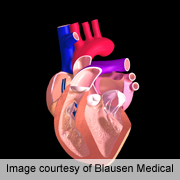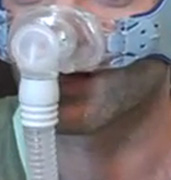healthnewslink
Heart Disease Newsletter
June 25, 2012 |
| In this Issue |
|
|
|
|
PTSD Symptoms Common After Heart Attack: Study
Nightmares, elevated heart rate among signs that may increase risk of recurrent attack
 WEDNESDAY, June 20 (HealthDay News) -- One in eight heart attack survivors experiences signs of post-traumatic stress disorder, the same condition that disables many combat veterans and assault victims, according to a new analysis.
And development of post-traumatic stress disorder (PTSD) symptoms doubles heart patients' risk of a second heart attack or death within three years, researchers found.
"You find almost exactly a doubling of risk for recurrent heart attack or death from heart attack if they have PTSD at one month [after the original heart attack]," said Donald Edmondson, assistant professor of behavioral medicine at Columbia University Medical Center in New York City.
Common characteristics of PTSD include nightmares, avoidance behaviors, elevated blood pressure and rapid heart rate.
The study indicates that PTSD, an anxiety disorder brought on by trauma, "can occur from any life-threatening event," Edmondson said.
"PTSD has become known as a combat disorder, which is a fundamental misunderstanding of PTSD," he said.
For the study, Edmondson pooled the results of 24 published studies involving almost 2,400 heart patients. Overall, 12 percent of the patients displayed significant PTSD symptoms, and about 4 percent met the criteria for a full diagnosis of PTSD.
In addition, three studies that followed more than 600 patients with PTSD after a heart attack showed these patients had twice the risk of recurrent heart attacks or death.
The analysis is published online June 20 in the journal PLoS ONE.
In the studies, patients were asked about PTSD symptoms at least one month and up to 10 years after their heart attack. On average, patients were interviewed less than two years after.
Symptoms must last more than one month after the event before a formal PTSD diagnosis can be made, experts concur.
Dr. Marcia Slattery, director of the University of Wisconsin Anxiety Disorders Program, called the new analysis ''an important study."
Cardiologists have long been aware that depression often occurs after heart attacks, she said. They may, however, be surprised at the how often instances of PTSD and PTSD symptoms were found by Edmondson, she said.
The key question, Slattery said, is: Who are the 12 percent displaying symptoms? Determining which risk factors predispose some patients to PTSD could help identify those likely to need assistance.
Simon Rego, director of psychology training at Montefiore Medical Center in New York City, said the new analysis sheds light on an area that hasn't been studied extensively.
Experts know some patients recover on their own, he said. For others, the outlook isn't that good.
"[For some], something interferes with the natural recovery process," Rego said. "People who end up with the diagnosis tend to think the memories are as threatening as the event itself."
As a result, they may adopt negative behaviors, such as avoiding anything that reminds them of the event. For those people, cognitive behavioral therapy -- a structured and goal-oriented approach to therapy -- can help them separate their memories of the event from the event itself, Rego said. In the process, they can resume a more normal lifestyle.
For heart attack patients, the take-home message is to pay attention to your symptoms, Edmondson said.
"If it's a month after your heart attack and you still find you are not able to get on with life -- you still are experiencing the event, having nightmares -- then it is time to say something," he said.
The U.S. National Institutes of Health funded the study.
More information
To learn more about PTSD, visit the National Institute of Mental Health.

|
Weight-Loss Surgery Cuts Heart Risk 7 Years Later: Study
Patients maintained lower weight, improvement in cholesterol levels
 WEDNESDAY, June 20 (HealthDay News) -- Seven years after they underwent weight-loss surgery, patients as a whole fared better on several measurements of their risk of cardiac problems, a new study finds, and many returned to normal levels.
The findings don't prove that weight-loss surgery reduces the risk of events such as heart attack and stroke, although other research has suggested it does. And weight-loss surgery, which includes procedures such as gastric bypass, comes with major risks of its own and is only recommended for some severely obese patients.
Still, the findings suggested the procedure provided plenty of cardiac benefit to the patients, said study co-author Dr. John Morton, director of bariatric surgery and surgical quality at Stanford University School of Medicine. "For most of them, they came back to normal," he said. "There were roughly about a dozen measurements altogether, and there were substantial improvements across the board."
Weight-loss surgery, also known as bariatric surgery, aims to help severely obese people lose weight by shrinking the amount of food that their digestive systems can handle. The cost of the procedures ranges from $20,000 to $25,000, according to the Weight-Control Information Network of the U.S. National Institutes of Health.
A Swedish study published in January in the Journal of the American Medical Association suggested that the procedure reduces the risk of death from heart attack. Obese people who had the procedure were less likely than similar people to die from a cardiovascular problem (such as a heart attack) or suffer a first-time heart attack or stroke.
The new study looked at several measurements that indicate whether a person is at higher risk of cardiac problems, including levels of "bad" LDL and "good" HDL cholesterol, triglycerides and a specific protein.
The researchers tracked 182 patients -- mostly women, average age 44 years -- and managed to keep tabs on 78 of them for seven years. After seven years, the average patient weight fell from 286 pounds to 205 pounds. Their average cholesterol reading dipped from 184 to 174, LDL cholesterol dropped from 113 to 92, and triglycerides fell from 151 to 87.
On average, patients had big drops in a measurement of high-sensitivity C-reactive protein, the investigators found. People with high levels of this protein are at greater risk of heart attack and stroke.
The research is important because it tracks the effects of weight-loss surgery over several years, said Dr. Robin Blackstone, president of the American Society for Metabolic and Bariatric Surgery. The procedures may help patients reduce risk through weight loss and an accompanying change in the body's metabolism and the related workings of the heart, she said.
Lona Sandon, an assistant professor of clinical nutrition at the University of Texas Southwestern Medical Center at Dallas, cautioned that weight-loss surgery has pros and cons.
While it can help people lose weight fairly quickly, "which is important for people who are at high risk, such as those with heart disease and uncontrolled diabetes," the surgeries can cause complications, such as infections, she said. "Also, it can lead to malnutrition, as the amount of food someone can eat is very restricted and because part of the intestine is bypassed, meaning some nutrients cannot be absorbed."
The study is scheduled to be presented Wednesday at the annual meeting of the American Society for Metabolic and Bariatric Surgery, in San Diego. The data and conclusions should be viewed as preliminary until published in a peer-reviewed journal.
More information
For more about weight-loss surgery, try the U.S. National Library of Medicine.

|
Anxiety, Depression May Raise Stroke Risk
Screening for psychological distress could save patients' lives, researchers say

MONDAY, June 18 (HealthDay News) --
People suffering from anxiety, depression, sleeplessness or other forms of psychological distress are at greater risk of death from a stroke, according to a new study.
Researchers from University College London pointed out that psychological distress affects about 15 percent to 20 percent of the general population. Previous research has linked these common mental conditions with coronary artery disease, but an association with stroke and other cardiovascular diseases has not been established, they said.
The researchers examined information from a study of 68,652 adults who participated in the Health Survey for England. The vast majority of participants were white, 45 percent were men and the average was about 55.
Nearly 15 percent of the people questioned said they were affected by psychological distress, most of them women. Those who reported having psychological distress also tended to be younger, smokers and taking medication for high blood pressure. They also tended to have lower incomes, the researchers added.
After following the participants for an average of about eight years, the study's authors found 2,367 deaths from ischemic heart disease (blocked artery), stroke and other cardiovascular problems.
The study was published June 18 in CMAJ.
"Psychological distress was associated with death from cardiovascular disease, and the relation remained consistent for specific disease outcomes, including ischemic heart disease and cerebrovascular disease," Dr. Mark Hamer, of the college department of epidemiology and public health, and his co-authors said in a journal news release. "We saw an association between psychological distress and risk of cerebrovascular disease among our participants, all of whom had been free from cardiovascular disease at baseline. This association was similar in size to the association between psychological distress and ischemic heart disease in the same group."
The researchers concluded that questionnaires could help doctors screen their patients for common mental illnesses, which could reduce their risk of death from heart disease and stroke.
More information
The U.S. National Institutes of Health provides more information on the causes of stroke.

|
Sleep Apnea 'Mask' Might Also Help the Heart
CPAP treatment was tied to lowered odds for high blood pressure, study found
 TUESDAY, May 22 (HealthDay News) -- New research suggests that treating obstructive sleep apnea, a common cause of snoring and daytime sleepiness, might also cut down on a serious health hazard associated with the condition -- the risk of developing high blood pressure.
Researchers in Spain examined the number of new cases of high blood pressure in two groups with sleep apnea who used continuous positive airway pressure therapy, or CPAP, for either about four or 11 years. CPAP involves the use of a mask to help push air into the lungs while asleep.
The results were published in a pair of studies in the May 23/30 issue of the Journal of the American Medical Association.
Both studies found that people who used CPAP, the most common treatment for sleep apnea, for at least four hours a night had lower rates of developing high blood pressure compared with those who were not prescribed CPAP or who used it less regularly.
"CPAP seems to have a protective effect in patients who use the machine properly," said Dr. José Marin, director of the Sleep Respiratory Unit at Miguel Servet University Hospital in Zaragoza, an author of both studies.
However, about 10 percent of people used the machine for fewer than four hours nightly, which is considered the minimum amount to see benefits, Marin said.
Many patients are uncomfortable with CPAP because it is inconvenient and the mask covers their nose while they sleep, or the person they sleep with does not like the noise the machine makes, Marin said.
But alternative treatments, such as surgery or mouth devices, generally don't work as well as CPAP, and there are less data suggesting they reduce the risk of high blood pressure, said Dr. Aneesa Das, assistant director of the sleep disorders program at the Ohio State University Wexner Medical Center.
A reduction in high blood pressure risk could also reduce the risk of other diseases, such as heart failure, which are more common in people with sleep apnea. "The idea is that there are probably multiple factors that are causing cardiovascular events and stroke [in sleep apnea patients], including [high blood pressure]," said Das.
It is estimated that 17 percent of U.S. adults have obstructive sleep apnea, which occurs when the airway closes during sleep and restricts breathing. It can cause people to wake up repeatedly and can lead to low levels of oxygen in the blood.
One of the studies included about 1,900 patients at Marin's sleep clinic who did not have high blood pressure. Their average age was 50.
The researchers assigned participants to CPAP treatment if they had severe obstructive sleep apnea or a less severe form along with daytime sleepiness. Then they measured their blood pressure each year for an average of 11 years.
The investigators found that patients with sleep apnea who used CPAP therapy were 29 percent less likely to develop high blood pressure during the study than the "control" group, which did not have sleep apnea and did not receive CPAP. However, as Marin pointed out, the people in the control group were "snorers, and they have been reported to have cardiovascular problems."
The researchers also found that patients with sleep apnea who did not use CPAP had higher rates of high blood pressure compared with the control group.
For example, the 10 percent of 922 participants who did not use CPAP at least four hours a night had a 78 percent higher risk of developing high blood pressure than the control group.
The researchers found that the lower risk of high blood pressure in the CPAP group could not be explained by differences in factors such as patients' body mass index (a measurement that takes into account height and weight), alcohol use or blood pressure at the beginning of the study.
However, there could still be differences between the CPAP-treated and untreated groups that could make the CPAP group less likely to develop high blood pressure, Marin said.
Marin and his colleagues conducted a second study in which they randomly assigned 725 patients who had obstructive sleep apnea but not daytime sleepiness to use CPAP or not to use CPAP. Then they tracked participants' blood pressure and heart disease for an average of four years.
At first the researchers did not see a statistically significant difference between the groups. However, 36 percent of the CPAP group was using the machine less than four hours a night.
In a follow-up analysis, which the authors pointed out may be open to bias, the researchers found that patients using CPAP for at least four hours a night were 28 percent less likely than the control group to develop high blood pressure.
Dr. Stuart Quan, professor of sleep medicine at Harvard Medical School in Boston, wasn't surprised by the findings. "I already believe that sleep apnea impacts [high blood pressure] and treating with CPAP reduces the risk, so these studies do not affect my way of thinking about this," he said.
Quan added that he prescribes CPAP to patients with at least moderate obstructive sleep apnea or those with sleep apnea and symptoms such as daytime sleepiness or mood problems.
Medicare requires patients to use CPAP at least four hours a night for 70 percent of nights to cover the treatment. The insurance deductible for CPAP is usually between $100 and $500, Quan said.
While the study uncovered an association between CPAP use and reduced risk of developing high blood pressure, it did not prove a cause-and-effect relationship.
More information
To learn more about sleep apnea, visit the U.S. National Heart, Lung, and Blood Institute.

|
| Copyright © 2012 ScoutNews, LLC. All rights reserved. |
|